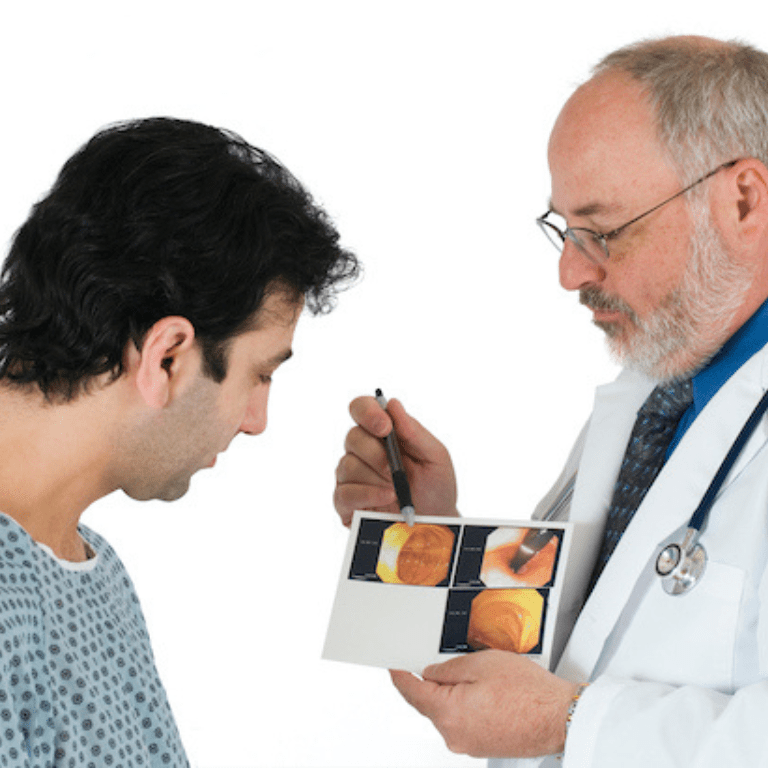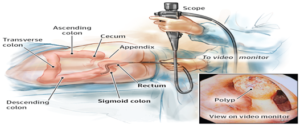
Overview
Screening for colorectal cancer (CRC) is the protocol for the detection of CRC and precancerous lesions (polyps) in asymptomatic people without a history of cancer or precancerous lesions. Screening allows the detection of polyps before they degenerate into cancer (polyps rarely cause symptoms), and the detection of cancer at an early stage, when the treatment is less aggressive and more successful. Colorectal cancer is a disease that can be cured in more than 90% of patients if it is detected early. The American Gastroenterological Association and the American Society for Gastrointestinal Endoscopy have endorsed the proposal of systematic CRC screening for middle-aged people (with no family history of high risk of CRC) after 50 years of age.
Risk of developing colon cancer
- Low risk. This group is formed by people under 45 years of age with no family or personal history of colorectal cancer or polyps. In this context, it is very unlikely to develop colorectal cancer, so they are not considered candidates for screening for this pathology.
- Average risk. This group consists of men and women over 45 years of age, with no personal or family history of colorectal cancer or polyps. It is estimated that these patients have a 5-6% chance of developing colorectal cancer. Therefore, the performance of any screening technique for colorectal cancer after the age of 50 is indicated.
- High risk. This group is formed by people who have a family history of colorectal cancer, a personal history of inflammatory bowel disease (Crohn’s disease or ulcerative colitis), have had colorectal cancer or polyps, or belong to a family with hereditary colorectal cancer. In these cases, the probability of developing colorectal cancer is higher, which may be 15-20% in the case of people with a first-degree relative diagnosed with cancer before age 60, or 80% in patients with Lynch syndrome (hereditary colorectal cancer not associated with polyposis). In these cases, the most appropriate screening test is colonoscopy, with an age of onset and periodicity that will depend on the patient’s clinical situation (1).
Screening for colon cancer
It is important to keep in mind that screening is aimed at people without symptoms. If you have bloody stools, changes in bowel habit for more than six weeks, unexplained weight loss or fatigue, or persistent abdominal discomfort, you should consult your doctor to perform the appropriate study.
The most commonly used screening methods are fecal occult blood detection and colonoscopy. There are other methods such as sigmoidoscopy, virtual colonoscopy or, more recently, faecal DNA testing, which are used less frequently.
- Detection of occult blood in the stool. This is a simple method that requires the microscopic evaluation of a stool sample to detect the presence of blood. Currently, this detection is performed by an immunological method that allows the analysis of human hemoglobin in feces. This test requires repeated every 1-2 years, and in the case that a positive result is obtained, a colonoscopy should be performed to rule out the presence of polyps or cancer.
- Colonoscopy. It is a test that involves inserting a flexible tube with a video camera through the anus to visualize the entire interior of the large intestine or colon. Colonoscopy allows colon polyps to be detected and removed, as well as taking samples to perform biopsies or to apply other treatments.Colonoscopy provides an important benefit compared to other screening methods due to its ability to detect and eliminate conventional adenomas <1 cm. The advantages of colonoscopy are its high sensitivity for the detection of cancer and all types of precancerous lesions, diagnosis and treatment in a single session and the long intervals between examinations (10 years) in subjects with normal results (2).

Conclusion
Anyone over 50 years of age with no family history of colon cancer should undergo any colorectal cancer screening technique. Colonoscopy screening allows detecting and eliminating precancerous lesions and colorectal cancer in early stages, which greatly increases the success of treatment. This procedure can save lives! Get checked! At Gastroenterology of Greater Orlando, we have the very best of GI doctors that are happy to help treat colon polyps and prevent colon cancer with top-notch colonoscopy procedures.